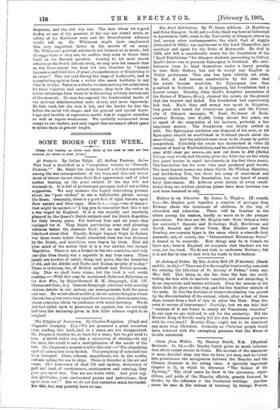SOME BOOKS OF THE WEEK.
rund... this heading los notice such Books of the weak as have not been reserved for review in other forms.] At Pretoria. By Julian Ralph. (C. Arthur Pearson. 6s.)— This book is described as a "companion volume to 'Towards Pretoria.' " Mr. Ralph has made himself a distinct reputation among the war correspondents of the time, and this new instal- ment of letters (recast since their first appearance) and of other matter bearing on the great subject of the day will not diminish it. It is fall of picturesque passages, and of not a little suggestion. We may instance the highly interesting passage about the "poor whites," to use a well-known phrase among the Boers. Generally, there is a good deal of light thrown upon Boer nature and Boer ways. Here is a l ,,:sage—one of many— that might be quoted I beg you to remember that this is not a war waged by England. It is a war steadily and stealthily planned by the Queen's Dutch subjects and the Dutch Republics for fully twenty years. For between four and six years they equipped for it. They began purchasing arms and planning defences before the Jameson Raid; let no one fool you with falsehood about that. Finally, Kruger begged Steyn to declare war three weeks before Steyn consented, then war was declared by the Dutch, and hostilities were begun by them. Next rid your mind of the notion that it is a war against two farmer Republics. There is not a farmer in the two countries, and only one (the Free State) was a republic in any true sense. These people are herders of cattle, sheep. and goats, like the Israelites of old, and the Mridis and Turks and Balkan peoples of to-day." There is criticism, too, of British methods and British general. ship. This we shall leave alone ; but the hook is well worth reading.—With this may be mentioned Notes and Reflectzons on the Boa' War, by Major-General H. M. Bengough, C.B. (W. Clowes and Sons, 38.) General Bengough criticises with severity various details in our system, our arrangements both for peace and war. He writes about artillety, abuut entrenching (on which the war has given some very significant lessons), about manceuvres, about canteens, which he condemns with much fervency. We do not feel called upon to pronounce an opinion, but we certainly fee) that the testimony given in this little volume ought to be weighed.


































 Previous page
Previous page